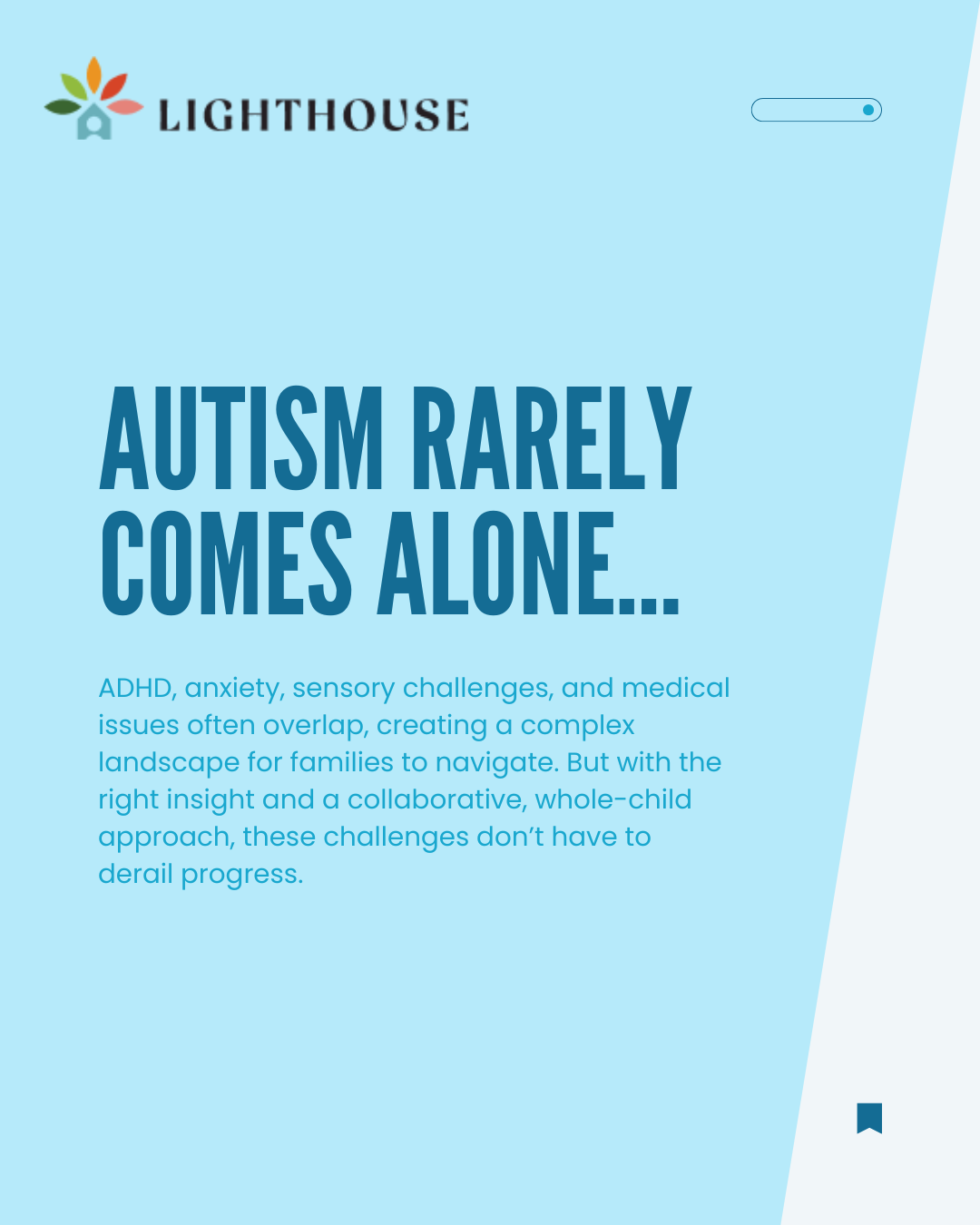Key Points:
- Autism often co-occurs with conditions like ADHD, anxiety, and gastrointestinal issues, which can complicate diagnosis and care.
- Understanding comorbid conditions helps guide more effective, individualized treatment plans.
- Therapists recommend comprehensive, coordinated care strategies that take all overlapping conditions into account.
When a child is diagnosed with autism, many parents feel a mix of relief and uncertainty. Relief to have an explanation—and a path forward. But also uncertainty, because autism rarely travels alone. From anxiety and ADHD to sleep disorders and epilepsy, comorbidities in autism are more common than most realize.
Understanding autism comorbidities is essential not only for accurate diagnosis but also for creating effective and compassionate treatment plans. These overlapping conditions can complicate everything from communication to behavior and learning. And while each child is different, knowing what other challenges might be at play can empower families to make more informed decisions.
Let’s walk through the most frequently co-occurring conditions, how they show up, and what therapists typically recommend in response.
 Why Comorbidities Matter in Autism
Why Comorbidities Matter in Autism
Before we get into specifics, it’s worth taking a moment to understand why this conversation matters.
Autism is a neurodevelopmental condition, but it doesn’t exist in a vacuum. In fact, studies show that a significant percentage of autistic individuals have at least one additional diagnosis—sometimes more. These aren’t just side notes; they can affect everything from how a child learns to how they interact with the world.
Ignoring comorbid conditions can lead to incomplete support, or worse—interventions that miss the mark. A child struggling with behavior might actually be overwhelmed by anxiety. A student falling behind in class might be experiencing unrecognized seizures. It’s only when we consider the full picture that we can offer support that truly meets the child’s needs.
Common Comorbidities in Autism: What Parents Should Watch For
Understanding the most frequent comorbid conditions can help you spot signs early and know what questions to ask. Below are some of the most common co-occurring diagnoses, along with signs to look for and therapist recommendations.
1. ADHD (Attention-Deficit/Hyperactivity Disorder)
What it looks like:
Kids with both autism and ADHD may struggle to sit still, pay attention, or control impulses. Unlike classic ADHD, though, the hyperactivity might not always show up as movement—it could be verbal or internal (like racing thoughts).
What therapists recommend:
ABA therapists often work with behavior plans that address inattention and impulsivity directly. Sometimes, a combination of behavioral therapy and medication is recommended. Structure and predictability are key—visual schedules, clear routines, and consistent consequences can help a lot.
2. Anxiety Disorders
What it looks like:
Anxiety can manifest in repetitive questioning, difficulty with transitions, avoidance of certain places or people, or even physical symptoms like stomachaches. It may not look the way you expect—especially in nonverbal children.
What therapists recommend:
Cognitive-behavioral therapy (CBT), sometimes adapted for neurodivergent learners, is one option. In ABA, therapists may work on building coping strategies or gradually increasing tolerance to anxiety-inducing situations through desensitization. Visual supports and social stories are also useful.
3. Sensory Processing Disorder
 What it looks like:
What it looks like:
Some children may cover their ears at certain sounds, refuse certain textures, or seek out intense movement like spinning or crashing into things. This isn’t “just picky”—it’s a real neurological difference in how the brain processes sensory input.
What therapists recommend:
Occupational therapy (OT) is usually the frontline support for sensory challenges. However, ABA teams may collaborate closely with OTs to reinforce regulation strategies, build sensory breaks into daily routines, or reduce escape behaviors that stem from overstimulation.
4. Gastrointestinal (GI) Issues
What it looks like:
Chronic constipation, diarrhea, or complaints of tummy aches are surprisingly common among autistic children. Sometimes these are tied to restricted eating patterns, but not always.
What therapists recommend:
While ABA therapists don’t treat medical issues directly, they often help track symptoms or support routines around toileting and feeding. A GI specialist should be consulted, and collaboration between medical and behavioral teams can make a big difference.
Conditions That Often Get Missed (But Shouldn’t Be)
Some comorbidities are well-known. Others fly under the radar—either because they mimic features of autism or because they’re less talked about. That doesn’t mean they’re less important.
Let’s look at a few conditions that therapists often keep an eye out for, especially when progress seems slower than expected.
1. Epilepsy and Seizure Disorders
Seizures can be subtle—like a brief pause or a flutter of the eyes—and sometimes go unnoticed. But untreated, they can affect memory, learning, and behavior.
If your child has unexplained regressions or spacing out episodes, it’s worth talking to a neurologist. ABA therapists may flag these patterns for follow-up.
2. Sleep Disorders
Poor sleep is extremely common in children with autism, and it doesn’t always improve with time. Whether it’s difficulty falling asleep, staying asleep, or waking up too early, poor sleep can make every other issue worse.
Therapists may recommend routines that promote better sleep hygiene or use data to identify patterns. In some cases, sleep studies or pediatric consultation is warranted.
 3. Depression and Mood Disorders
3. Depression and Mood Disorders
Especially in older children and teens, symptoms like withdrawal, irritability, or changes in appetite can be signs of depression. These may be mistakenly chalked up to “just being autistic” when they are, in fact, treatable.
Therapists often focus on increasing engagement, building positive reinforcement systems, and teaching emotion identification skills. Referrals to mental health providers may also be necessary.
Coordinated Care: What Therapists Recommend for Complex Needs
When a child has autism and additional diagnoses, care coordination is everything. It’s not just about collecting labels—it’s about creating a unified plan that works in real life.
Here’s what therapists usually recommend when navigating autism and comorbidities:
1. Prioritize Assessments That Look Beyond Autism
If your child is already diagnosed with autism but continues to struggle in unexpected ways, it may be time to revisit evaluations. A thorough developmental, psychiatric, or neurological workup can uncover additional needs.
2. Build a Multi-Disciplinary Team
An ideal support team might include:
- A BCBA (Board Certified Behavior Analyst) or ABA team
- Occupational therapist (OT)
- Speech-language pathologist (SLP)
- Pediatrician and/or developmental pediatrician
- Psychologist or psychiatrist
- Neurologist or gastroenterologist (when needed)
Therapists will often collaborate to share data, align goals, and make sure interventions complement each other.
3. Use Data to Guide Decisions
Tracking behaviors, sleep, toileting, and eating patterns can offer clues about underlying issues. ABA therapy often includes detailed data collection, which can be shared with medical professionals to inform next steps.
4. Focus on Functional Skills First
Instead of tackling every issue at once, therapists usually prioritize areas that improve the child’s day-to-day life—communication, safety, self-care, and regulation. These build a foundation for other treatments to succeed.
 Summary and Final Thoughts
Summary and Final Thoughts
By understanding autism comorbidities and working closely with professionals, parents can advocate for meaningful, individualized care. You don’t have to figure it all out at once. But knowing what to look for—and what therapists recommend—can make the journey a little less overwhelming.
Support for Families Navigating Autism and Comorbidities
Lighthouse ABA offers individualized ABA therapy in NYC and NC tailored to your child’s unique profile. Our team understands that autism comorbidities can affect how your child learns, communicates, and thrives—and we’re here to help create a plan that reflects the full picture.
Ready to explore how ABA can support your child? Reach out to Lighthouse ABA today.


